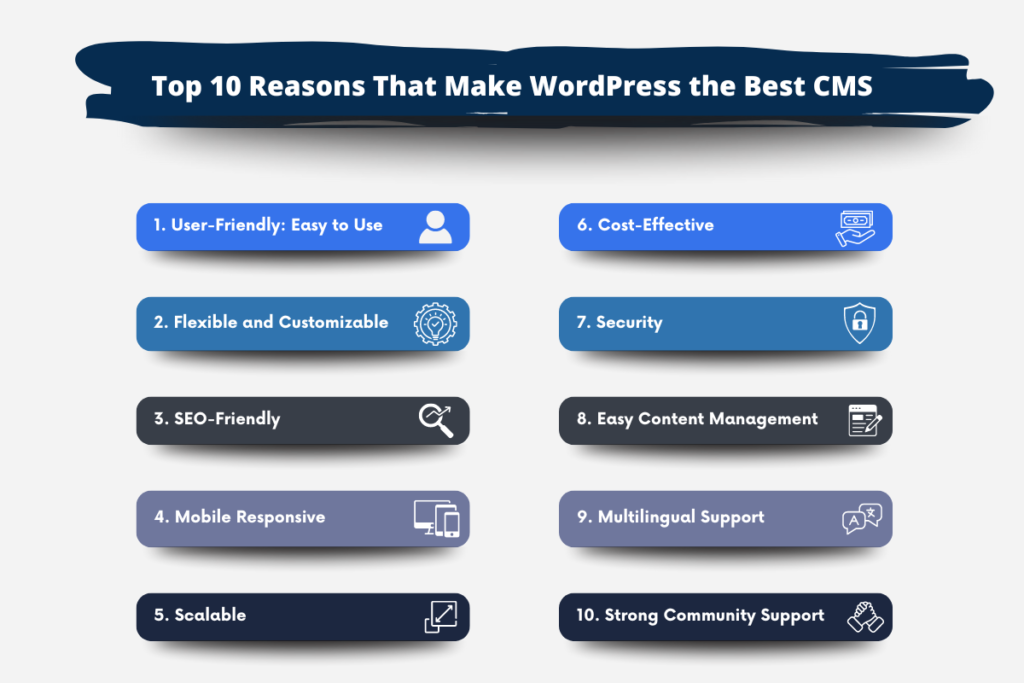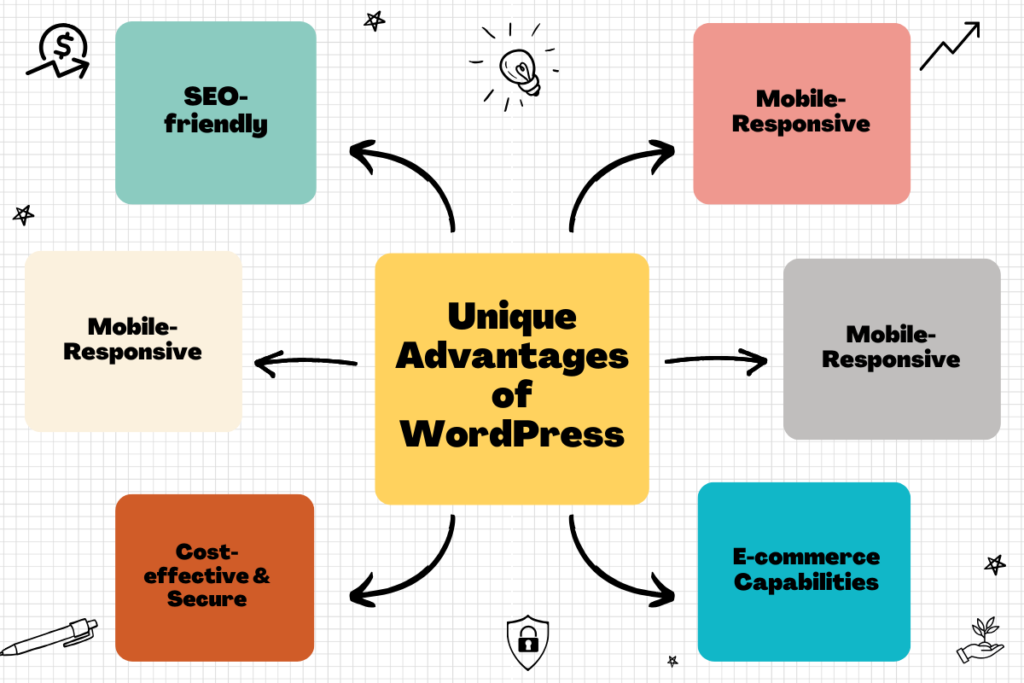
WordPress is the most popular tool for building websites, with over 40% of all websites on the internet using it. It started in 2003 as a simple blogging tool but has grown into a powerful platform that can be used for all kinds of websites. Its popularity is due to its ease of use, flexibility, and strong community support.
Statistics show that WordPress powers over 63% of all websites that use a content management system (CMS). This reflects its ability to cater to a wide range of needs, from personal blogs to complex business sites.
Top 10 Reasons Why WordPress Is the Best Choice for CMS Web Development

1. User-Friendly
- Easy to Use: WordPress is designed with a focus on simplicity and user experience. The dashboard is intuitive, with a straightforward layout that allows users to manage content efficiently. Even those without any coding knowledge can navigate through the system, add new pages or posts, and update existing content.
- Example: If you want to add a new blog post, you simply go to the “Posts” section, click “Add New,” enter your text, and hit “Publish.” The visual editor is similar to using a word processor, making it accessible for everyone.
2. Flexible and Customizable
- Themes and Plugins: WordPress offers a vast selection of themes and plugins. Themes control the design and layout of your site, while plugins add specific features or functionalities. This allows you to customize your site to match your brand and needs.
- Example: Suppose you want a contact form on your site. You can choose from various contact form plugins like Contact Form 7 or WPForms, and you can select a theme that aligns with your brand’s aesthetic from thousands of available options.
3. SEO-Friendly
- Better Visibility: WordPress is built with search engine optimization in mind. It includes features that help improve your site’s visibility in search engines, such as clean permalink structures, the ability to add meta tags, and more.
- Example: Using the Yoast SEO plugin, you can optimize your content with keywords, generate XML sitemaps, and analyze your content’s readability. This helps search engines understand and rank your site better.
4. Mobile Responsive
- Works on All Devices: Many WordPress themes are designed to be mobile responsive, meaning they adjust their layout based on the device’s screen size. This ensures that your site looks and functions well on smartphones, tablets, and desktops.
- Example: A responsive theme will rearrange elements like navigation menus and images to fit smaller screens, providing a seamless experience whether your visitors are using a phone or a desktop computer.
5. Scalable
- Grows with Your Needs: WordPress can accommodate websites of any size and complexity. As your site grows, you can easily add more features, pages, and content. This scalability makes it suitable for both small personal blogs and large corporate websites.
- Example: You can start with a basic blog and, as your business expands, integrate features like an online store, booking system, or membership area without needing to switch platforms.
6. Strong Community Support
- Help and Resources: WordPress has a large and active community of developers, designers, and users. This community contributes to forums, blogs, and tutorials, providing a wealth of resources and support.
- Example: If you encounter a problem or need to learn how to add a feature, you can find countless tutorials on YouTube or detailed guides in WordPress forums.
7. Cost-Effective
- Free to Use: WordPress itself is free and open-source, which means you can download and use it without any cost. Many themes and plugins are also available for free, although there are premium options for those who want additional features.
- Example: You can build a fully functional website using free themes and plugins, spending money only if you choose to purchase premium themes, plugins, or a custom domain.
8. Security
- Regular Updates: WordPress is frequently updated to address security vulnerabilities and improve functionality. It also offers a range of security plugins to enhance your site’s protection.
- Example: Plugins like Wordfence provide firewall protection, malware scanning, and login security features to help safeguard your site from potential threats.
9. Multilingual Support
- Different Languages: WordPress supports multiple languages, making it easier to create multilingual websites. This feature is beneficial for reaching a global audience.
- Example: With plugins like WPML or Polylang, you can translate your site’s content into different languages and provide a localized experience for users around the world.
10. Easy Content Management
- Organize Content: WordPress allows you to efficiently manage and organize your content. You can categorize posts, add tags, and create custom menus to structure your site in a way that makes sense for your audience.
- Example: If you run a blog about travel and food, you can create categories like “Travel” and “Food,” and use tags for specific destinations or recipes, helping visitors easily find related content.
Overall, WordPress is a versatile and user-friendly platform that offers a range of features and tools to help you create and manage your website effectively.
Unique Advantages of WordPress That Set It Apart From Other CMS Platforms like Drupal or Custom-coded Websites

WordPress stands out from other CMS platforms like Drupal and custom-coded websites due to its unique features and benefits. With an extensive library of over 60,000 plugins, users can easily add a wide range of functionalities without needing to write code. Its user-friendly interface ensures that even those with minimal technical skills can manage and update their websites effortlessly.
1. Extensive Plugin Library
- Unique Advantage: WordPress has a vast library of plugins (over 60,000) that can add almost any functionality to your website without needing custom coding. This includes everything from SEO tools to advanced e-commerce features.
- Example: You can find plugins for specific needs, like integrating social media feeds, adding chatbots, or creating custom forms, which can be challenging to implement in other CMS platforms.
2. User-Friendly Interface
- Unique Advantage: WordPress is renowned for its user-friendly and intuitive interface. Unlike some other CMSs that may have steep learning curves or require technical knowledge, WordPress is designed to be accessible to users of all skill levels.
- Example: The visual editor in WordPress resembles a standard word processor, making it easier for non-technical users to create and edit content.
3. Large Theme Marketplace
- Unique Advantage: WordPress has a vast marketplace for themes, both free and paid, which provide ready-to-use designs and layouts. This is more extensive compared to other CMS platforms like Drupal, which may require more manual customization.
- Example: You can find thousands of themes for various purposes, including business websites, portfolios, blogs, and online stores, which can be quickly installed and customized.
4. Automatic Updates
- Unique Advantage: WordPress handles automatic updates for its core software, themes, and plugins. This feature helps ensure that your site remains secure and up-to-date without requiring manual intervention.
- Example: When a new version of WordPress is released, it automatically updates your site, reducing the risk of security vulnerabilities that might require manual updates in other CMSs.
5. Integrated Media Management
- Unique Advantage: WordPress includes a built-in media library that allows you to easily upload, manage, and edit images, videos, and other media files.
- Example: You can drag and drop files into the media library, and it will automatically create different sizes of images for various uses, which can be more cumbersome in other CMS platforms.
6. Extensive Support for E-Commerce
- Unique Advantage: WordPress has dedicated e-commerce plugins like WooCommerce, which are highly customizable and integrate seamlessly with the platform. This provides a comprehensive solution for setting up online stores.
- Example: WooCommerce allows you to manage products, handle transactions, and even set up shipping options directly within WordPress, offering more flexibility and ease of use compared to other CMSs.
7. Comprehensive Documentation and Tutorials
- Unique Advantage: The WordPress community provides extensive documentation, tutorials, and guides that are accessible to users at all levels. This support network is more extensive compared to other CMS platforms.
- Example: You can find detailed guides and video tutorials on everything from basic setup to advanced customizations, making it easier to solve issues or learn new features.
8. Built-in Blogging Capabilities
- Unique Advantage: WordPress started as a blogging platform and includes robust blogging features right out of the box. It supports categories, tags, comments, and post formats, which might require additional modules or customization in other CMSs.
- Example: You can easily set up a blog with various post types, schedule posts, and manage comments without needing additional plugins or custom development.
9. Global Community and Meetups
- Unique Advantage: WordPress has a global network of users and developers who regularly organize meetups, and conferences, and contribute to forums. This strong community support is a unique advantage for troubleshooting and networking.
- Example: WordCamps and local meetups provide opportunities to connect with other WordPress users, learn from experts, and get advice on your projects.
10. Built-in User Management
- Unique Advantage: WordPress offers built-in user roles and permissions, allowing you to manage different types of users with varying levels of access. This feature is more straightforward compared to setting up user roles in some other CMS platforms.
- Example: You can assign roles like Administrator, Editor, Author, and Contributor, each with specific permissions, to control who can edit or publish content on your site.
11. Customizable Permalinks
- Unique Advantage: WordPress allows you to easily customize the URL structure of your pages and posts, which helps with SEO and improves user experience.
- Example: You can create clean, descriptive URLs like example.com/blog/my-first-post instead of complex, default URLs.
These features highlight why WordPress is a preferred choice for many users and businesses, offering a combination of ease of use, flexibility, and extensive support that can be challenging to find in other CMS platforms.
Conclusion
In summary, WordPress offers a range of unique advantages that set it apart from other CMS platforms and custom-coded websites. Its ease of use, flexibility, and extensive support make it an ideal choice for anyone looking to build a website, whether for personal use, a small business, or a large corporation. With its vast library of plugins and themes, automatic updates, and strong community support, WordPress simplifies the process of creating and managing a website, allowing users to focus on their content and business goals. Whether you’re a beginner or an experienced web developer, WordPress provides the tools and resources needed to build a professional, functional, and visually appealing website.





Thanks for sharing this wordpress related information. I was very confused earlier with wordpress and wix platform for website development. Now I’ve clarity regarding this.